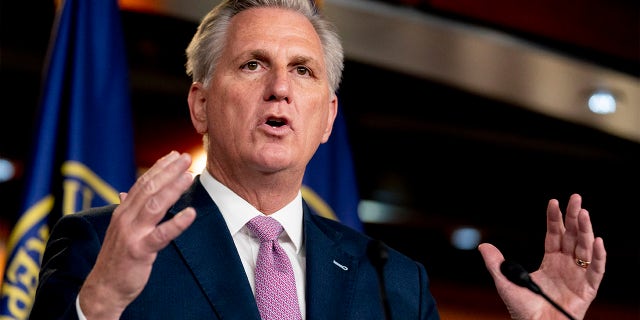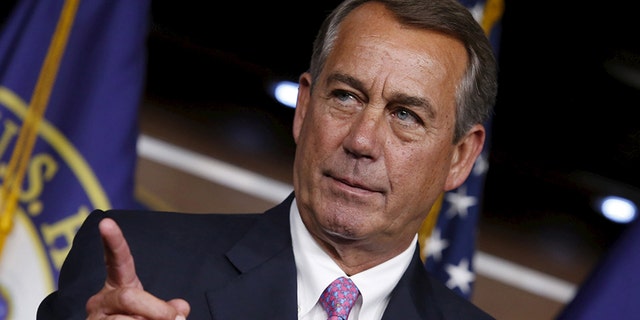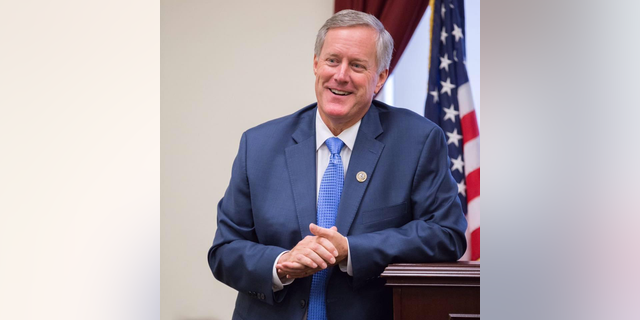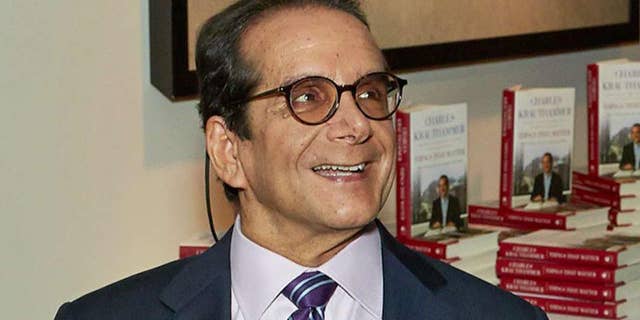Would GOP, other factors eclipse a McCarthy bid to become House speaker?
NEW York can now listen to Fox News articles!
Earth’s shadow first skimmed the edge of the moon’s disc at 2:18 a.m. ET last Friday. This was the start of the so-called “Beaver Moon” eclipse, the longest lunar eclipse since 1440.
In other words, the last time this happened, it would be another 52 years before Christopher Columbus set sail in search of a passage to Asia.
House Republicans haven’t searched for a House speaker they can all truly rally around for 580 years.
At least it seems that way.
Perhaps it was only appropriate that House Minority Leader Kevin McCarthy, R-Calif., was five hours and 38 minutes into his speech last Friday morning when the eclipse began. By daybreak, McCarthy’s verbosity became the longest speech in House history.
MCCARTHY ACCUSES AOC, TIM RYAN OF ‘HECKLING,’ ‘TRYING TO SHUT ME DOWN’ DURING MARATHON HOUSE SPEECH
McCarthy’s oratory was the longest speech since House Speaker Nancy Pelosi, D-Calif., set the mark of eight hours and seven minutes in February 2018. McCarthy clocked in at eight hours and 32 minutes when he finished before dawn Saturday – with the eclipse still going.

House Minority Leader Kevin McCarthy of Calif., speaks in Washington, April 22, 2021.
(Associated Press)
On its face, McCarthy’s speech was a screed against passage of the Democrats’ social spending bill. But in reality, McCarthy’s declamation was part of a campaign – a stump speech for McCarthy to become speaker of the House should the GOP capture control of the chamber in the 2022 midterms.
Treacherous path
Here’s why it’s been such a treacherous path for Republicans when it comes to their selection of House speaker over the years.
Go back to late 1998. Republicans tired of former House Speaker Newt Gingrich, R-Ga. The GOP nearly lost control of the House in the 1998 midterms. Gingrich was damaged goods after a major ethics investigation.
The public thought Gingrich overplayed his hand with the impeachment of President Clinton. Political analysts believed Clinton got the better of Gingrich in an epic government shutdown standoff in late 1995 and early 1996.
So Gingrich stepped aside.
Former Rep. Bob Livingston, R-La., was the GOP choice to succeed Gingrich. But on the very day the House voted to impeach Clinton in December 1998, Livingston announced he wouldn’t stand for speaker in January 1999. It was revealed that Livingston had a marital infidelity of his own.
The next logical choice would have been then-House Majority Leader Tom DeLay, R-Texas. But DeLay was radioactive.
Plucked from obscurity, way down the GOP leadership ladder, was House Speaker Dennis Hastert, R-Ill.
An odd choice
Hastert was an odd choice for the GOP, even if DeLay was a problem for the party. But Republicans figured Hastert’s low-key, under-the-radar style was likely a good option after the bombastic Gingrich.
Hastert went on to become the longest-serving Republican House speaker in history – even though he was a second-tier default candidate by the GOP.
That said, it was always suggested that it was truly DeLay pulling the strings behind Hastert’s façade.
5 KEY MCCARTHY QUOTES FROM RECORD-LENGTH HOUSE FLOOR SPEECH
The GOP lost control of the House in 2006. Hastert did not seek a leadership post in 2007 and stepped down later that year.
However, it took until 2015 for the public to learn that Hastert made illegal bank withdrawals to serve as hush money. The feds argued that Hastert made the withdrawals to keep people quiet after he allegedly molested teenagers decades earlier as a high school wrestling coach and history teacher. Hastert then became the longest-serving U.S. official to serve jail time.
Along the way in late 2005, DeLay stepped aside from his leadership post due to his own ethics issues. DeLay was tried in court, convicted and later exonerated. But the damage was done.
Enter Boehner
Future House Speaker John Boehner, R-Ohio, upset current Sen. Roy Blunt, R-Mo., – then a congressman – in a race to succeed DeLay as majority leader. Few anticipated Boehner’s victory. Boehner then became an easy pick for Republicans to matriculate to speaker in January 2011. Republicans had just wrested control of the House from Democrats in the 2010 midterms, winning a staggering 63 seats.
But Boehner had a problem on his hands from the beginning.

Ohio Republican John Boehner retired from Capitol Hill as House speaker in 2015. (Reuters)
The GOP won the House because voters elected dozens of “tea party” conservatives outraged about government spending and ObamaCare propelled the party into the majority. However, some of the demands by voters – and promises made by Republicans – weren’t realistic. The party never repealed and replaced ObamaCare. Republicans attained a modest victory when it came to deficit spending in late 2011. But the spending cuts weren’t deep enough to satisfy some conservatives.
Conservatives dragged Boehner through a debt ceiling crisis with President Obama over spending in the summer of 2011 and a government shutdown in the fall of 2013.
Former House Majority Leader Eric Cantor, R-Va., was supposed to be Boehner’s successor. But Cantor improbably lost his primary in the spring of 2014. Cantor resigned. That propelled McCarthy to the post of majority leader.
Some conservatives were tired of Boehner when it was time to elect a new speaker in January 2015.
Boehner held on. Barely.
Wrestling for years
But this brings us to the essence of what Republicans have wrestled with in recent years with the House speakership. The House speaker must receive an outright majority of the entire House, not simply the most votes. The House is comprised of 435 members. The successful speaker candidate must marshal 218 votes.
The House can’t conduct business until it elects a speaker.
This exercise of electing a speaker consumed months in 1863 before the House finally settled on Speaker Howell Cobb, D-Ga. – on the 63rd ballot. It took Speaker Frederick Gillett, R-Mass., nine ballots over three days before he secured the necessary votes in 1923. A vote for speaker hasn’t gone to a second ballot since that vote to elect Gillett.
KEVIN MCCARTY DROPS THE GLOVES ON BUILD BACK BETTER AND KICKS OFF 2022 MIDTERM FIGHT
But in January 2015, there was an insurrection among some tea party affiliated Republicans who hoped to undercut Boehner.
Their coup attempt failed.
Boehner clung to the speakership in January 2015 because a number of members were absent on the first day of the Congress. In other words, the House actually began with a much smaller membership than usual. That’s because so many members were absent attending the funeral of late New York Gov. Mario Cuomo. The House had yet to swear-in those members when it took the speaker’s vote. So Boehner benefitted by a smaller House size at the start of that Congress.
Meadows resolution
However, détente didn’t last long.
By mid-July, then-Rep. Mark Meadows, R-N.C., crafted a resolution that served as a threat to Boehner. Meadows’s resolution would “vacate the chair” and force a vote for a Speaker election in the middle of the Congress.
Meadows never formally acted on his resolution. But Boehner got the message. Boehner announced his resignation in September.
McCarthy was next man up. For a week, it looked like McCarthy had the job in the bag.

Mark Meadows once crafted a resolution that served as a threat to John Boehner.
But some Republicans believed McCarthy could be the second coming of Boehner. Rumors swirled about McCarthy’s personal conduct. McCarthy committed a faux pas during an appearance on Fox. He suggested that the only reason the GOP investigate Benghazi was to sabotage a presidential bid by Hillary Clinton.
Some Republicans were searching for a reason to kneecap McCarthy in the first place. A top McCarthy aide told Fox at the time that their boss would fall just short of the 218 votes necessary to prevail in a floor vote for speaker.
McCarthy dropped out of the race at the last minute.
Republicans had all sorts of ideas about what to do next.
Future House Speaker Paul Ryan, R-Wis., said he wouldn’t run. Rep. Dan Webster, R-Fla., stepped in as an alternative candidate. Former Rep. Jason Chaffetz, R-Utah, ran. Rep. Michael McCaul, R-Tex., flirted with running. So did then-Rep. Lynn Westmoreland, R-Ga.
Krauthammer for speaker?
Republicans were so divided that it was nearly impossible for any candidate to secure an outright majority on the floor to become speaker. There was even chatter about House Republicans drafting a non-member to become speaker. That’s never happened. But some members of the Freedom Caucus tinkered with running the late columnist Charles Krauthammer for the speakership.
There is no requirement that the speaker be a member of the House.

Some Republicans once floated the idea of nominating Charles Krauthammer to become House speaker.
More on that in a moment.
After much teeth gnashing, the only consensus figure Republicans liked was Ryan – who wasn’t interested.
Ryan finally relented and won the speakership. Had Ryan not stepped forward Republicans may be waiting for that next lunar eclipse to select a speaker.
Ryan held the job until Jan. 3, 2019, when Pelosi took over as speaker.
Which takes us back to McCarthy.
McCarthy is much better positioned now to become speaker should the GOP flip the House in 2022. But some forces are still working against him. A few moderate GOPers believe it was McCarthy who singlehandedly resurrected the career former President Trump after the January riot. Others believe that McCarthy is still “too establishment.” Rep. Marjorie Taylor Greene, R-Ga., views McCarthy as “weak.”
There are a lot of grudges.
The winning candidate must achieve an outright majority of the entire House to become speaker – not the most votes.
Trump for speaker?
Re-enter Mark Meadows, the former president’s chief of staff, who tried to vaporize Boehner’s speakership in 2015.
Meadows stirred things up on a recent podcast. Known for his political Molotov cocktails, Meadows blasted McCarthy for letting 13 GOPers vote for the infrastructure bill. Some Republicans want McCarthy to relieve those members from their committee assignments.
“I would love to see the gavel go from Nancy Pelosi to Donald Trump,” said Meadows on the podcast. “You talk about melting down. People would go crazy.”
“I would love to see the gavel go from Nancy Pelosi to Donald Trump. You talk about melting down. People would go crazy.”
It’s unclear how serious this scenario is. But considering the standing of the former president in the party, if Mr. Trump wanted to be speaker, it’s unclear how McCarthy would fare in a 2023 floor vote.
This underscores the trouble Republicans faced trying to rally around a candidate for speaker of the House. It finally fell to Ryan six years ago after a very messy battle behind the scenes. Boehner got a pass – at first. But some of the problems the GOP faces when selecting a speaker date back to the late 1990s when Gingrich stepped aside.
CLICK HERE TO GET THE FOX NEWS APP
A potential push for President Trump to become speaker would represent one of the most extraordinary moves in American political history. Perhaps even more improbable than Mr. Trump’s surprising victory over Hillary Clinton in 2016.
But even President Trump would need an outright majority of the entire House to become speaker. 218 votes.
And if Republicans are stuck choosing between McCarthy or the former president, a battle that intense could take 580 years to settle.
Just like the eclipse.

